Iran's Khamenei Hosts Syria's Assad Amid Criticism of Foreign Policy
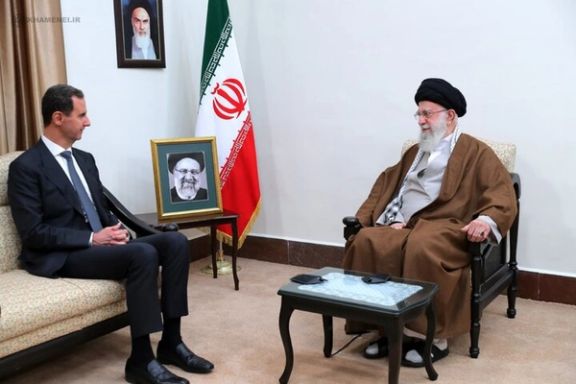
Iran’s Supreme Leader Ali Khamenei received his Syrian ally President Bashar al-Assad in Tehran on Thursday.

Iran’s Supreme Leader Ali Khamenei received his Syrian ally President Bashar al-Assad in Tehran on Thursday.
The visit comes shortly after the unexpected death of Iranian President Ebrahim Raisi in a helicopter crash. Assad’s visit is reportedly to offer condolences, reflecting the deep political and military alliance, criticized by many Iranians and Western governments.
Iran's semi-official Student News Network reported that Khamenei used the opportunity to assert that Western nations and their regional allies “failed” in their attempts to destabilize Syria’s government.
His remarks come amid widespread criticism of Iran's role in the Syrian civil war, which led to extensive human suffering and regional instability.
Assad was absent from Raisi’s funeral, with the country’s envoy to Tehran citing personal reasons for his absence, raising questions about the Syrian leader's commitment to his Iranian allies.
Iran has played a controversial role in the Syrian civil war, aligning itself with President Bashar al-Assad's regime against various opposition groups since the conflict began in 2011.
Tehran has provided substantial military support, including advisors, ground troops, and militia fighters from across the region, affecting the war's dynamics.
Iranian forces and militias are still in Syria, posing a threat to Israel that regularly launches air strikes against them.
Iran's involvement in Syria has been criticized internationally for perpetuating the conflict and contributing to the region's destabilization and countless deaths and widespread displacement.
Economically, the intervention has drained Iranian resources, contributing to domestic discontent amidst a struggling economy exacerbated by international sanctions.
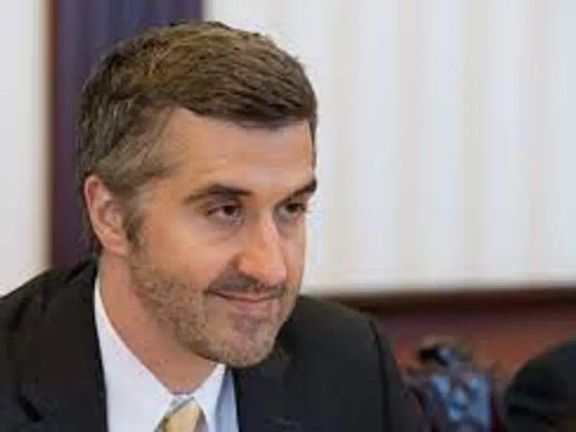
US Secretary of State, Antony Blinken, praised the work of US-Iranian Ramin Toloui, the Assistant Secretary for Economic and Business Affairs, leaving to pursue his career at Stanford University.
In a statement, Blinken said, "Ramin championed a guiding principle of our foreign policy: that economic security is national security."
According to the statement, throughout his service, Toloui was instrumental in implementing economic sanctions against Russia following its invasion of Ukraine, enhancing global food security, and addressing coercion by hostile international actors.
Blinken expressed deep appreciation for Toloui's "exceptional service," commending his leadership in engaging with the G20 and advancing partnerships with US businesses and workers.
Born and raised in Iowa City, Iowa, Toloui has an extensive background in both academia and the financial sector, having previously held positions at PIMCO and the Department of the Treasury before his appointment at the State Department.
Iranian-Americans, an integral part of the United States’ cultural fabric, have assumed critical roles across various sectors of American society, the biggest expatriate community of Iranians globally.
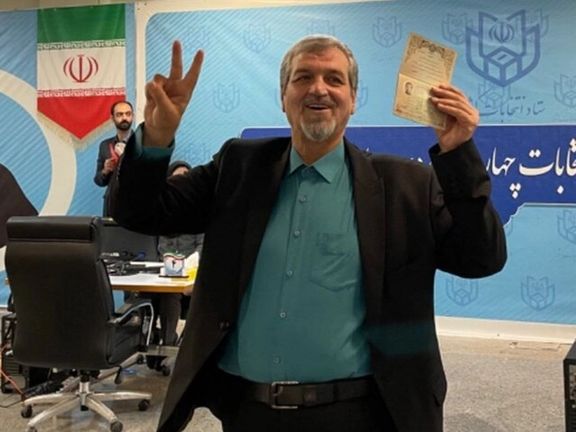
Mostafa Kavakebian, a reformist politician, has once again stepped into the fray by registering for the upcoming presidential election scheduled for June 28.
Kavakebian, 61, the Secretary General of the Democracy Party and editor-in-chief of the Mardomsalari newspaper, has faced numerous setbacks in his political career, including being disqualified by the conservative Guardian Council in 2005, 2013, 2017, and 2021 Presidential elections.
His political career includes serving as a representative in the Iranian Parliament for Tehran from 2016 to 2020, and earlier for Semnan and Mehdishahr from 2008 to 2012.
Meanwhile, an advisor to former interior minister Mostafa Pour-Mohammadi said Thursday that he too is going to register for the presidential election. Pour-Mohammadi, who served as minister of justice from 2013 to 2017, has been a controversial figure, particularly noted for his justification of the 1988 mass killings of political prisoners as fulfilling divine commandments.
Estimates indicate that between 4,500 and 10,000 prisoners were executed when the clerical rulers chose to eliminate those they considered oppositional.
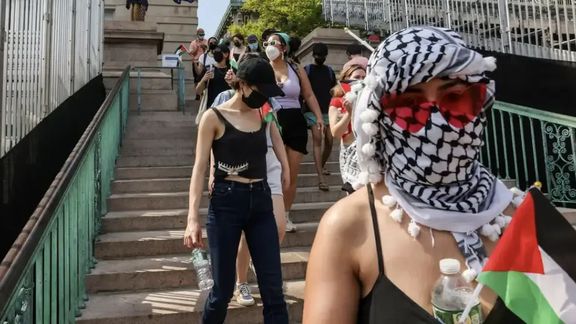
Iran's supreme leader has praised the pro-Palestine students, branding them part of Iran's 'resistance front' against the US and Israel.
“Dear university students in the United States of America, you are standing on the right side of history. You have now formed a branch of the Resistance Front and have begun an honorable struggle in the face of your government's ruthless pressure - which openly supports Zionists,” read a letter by Ali Khamenei.
The letter, dated May 25 and published on Khamenei's website on Thursday, predicts a "different fate awaits the important region of West Asia,” branding the students part of the “resistance front”, the group of militias Iran sponsors across the Middle East.
“The ‘resistance front,” the letter added, “rose amid this dark and bleak atmosphere, and the formation of ‘the Islamic Republic’ in Iran contributed to its expansion and strength.”
Thousands of students have taken to the streets and set up encampments at their campuses to protest against Israel which is in the midst of a war against Iran-backed Hamas in Gaza. Sparked by the Hamas invasion of October 7, in which 1,200 mostly civilians were killed, the retaliation has seen over 35,000 Palestinians killed according to Hamas. It has seen Israel accused of genocide as it continues its war aimed at annihilating Hamas and rescuing the remaining 125 hostages in Gaza. The US has defended Israel’s right to defend itself and continues to arm the world’s only Jewish state.
Khamenei added that the US administration had been providing the regime with continual political, economic, and arms support. “The American administration and its partners have not even as much as frowned upon this state terrorism and incessant oppression,” the letter read.
The letter sparked responses from across the political spectrum. US House Speaker Mike Johnson said: "When you’ve won the Ayatollah, you’ve lost America.”
Pro-Palestinian student protests in the US have been providing media fodder for the Islamic Republic as it continues to bet on political trouble overseas to make up for lost legitimacy at home.
Khamenei and his loyalists in the Iranian regime have seen victory in pro-Hamas protests in American universities, and the Supreme Leader on several occasions made sure to highlight this.
“Despite the extensive efforts of Zionists and their American and European supporters, the issue of Gaza remains the top global concern. Protests against the crimes of the Zionist regime in American universities and their expansion to European universities are signs of the continued sensitivity of public opinion worldwide to the Gaza issue,” Iran’s ruler said earlier in May.
A pro-government ideologue has expressed hope that the Islamic Republic can use the potential of pro-Palestinian protesting students at US campuses to form a new proxy group in America.
“I think the potential to repeat in the US what the Islamic Republic did in Lebanon is much higher. Our Hezbollah-style base in the US is much larger than what we have in Lebanon,” said University of Tehran professor Foad Izadi in an interview with Iran’s state TV in early May.
Khamenei has invested 35 years of his rule to relentlessly campaign against Israel, the United States and Western influence, not only in the Middle East but also in distant places in Africa and Latin America.
With heavy political and military investment on Hamas and other militant groups in the region, Khamenei seems desperate to showcase any sign of anti-Israeli and anti-Western public opinion at home and abroad as a sign of vindication for his worldview.
“The brutal and merciless behavior of the rabid Zionist dog proved the righteousness of the Islamic Republic's position and the Iranian people, and the massacre of thirty-some thousand people, half of whom are women and children, demonstrated the evil nature of the Zionist regime and the perpetual righteousness of Iran to the whole world,” according to Khamenei.
While Khamenei praises the protesters, Iran continues to quash dissent with hundreds of Iranians killed since 2022’s Women, Life, Freedom uprising and tens of thousands imprisoned.
Khamenei feels insecure after years of anti-regime protests by ordinary Iranians, whose social freedoms are being curtailed by Islamic restrictions and their economic status degraded by high inflation and lack of real jobs.
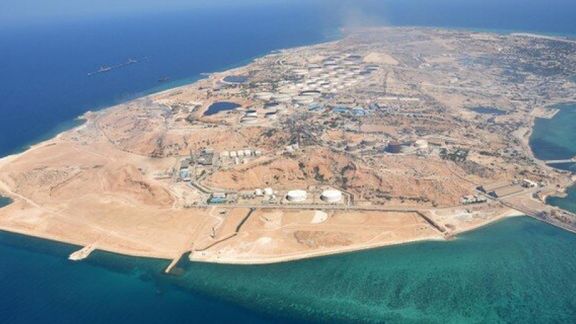
China may not support the territorial claims by the United Arab Emirates against Iran during a conference underway with Arab states in Beijing, Iran International has learned.
The UAE has laid claim to three small islands in the Persian Gulf that Iran took control of in 1971 after the United Kingdom withdrew from the Persian Gulf and the UAE was formed. Other Arab states formally support the territorial claim.
The China-Arab States Cooperation Forum opened in Beijing on Thursday with President XI Jinping speech. The Forum was established in 2004 as a formal dialogue mechanism between China and Arab states. China is seeking to strengthen its relations with Arab states as a model for maintaining world peace and stability, Xi was quoted as saying by state media at the gathering.
The summit is attended by heads of state from Egypt, the United Arab Emirates, Bahrain and Tunisia among others.
A diplomatic source close to the UAE-China negotiations told Iran International that Beijing has decided not to support the UAE's claim of ownership over the islands of Abu Musa, Greater Tunb, and Lesser Tunb at this meeting.
In exchange for this action, the Islamic Republic has promised to disrupt the development of the "International North-South Transport Corridor" (INSTC) project to slow down its progress.
The International North-South Transport Corridor is a strategic Russian-Indian-Iranian project that aims to connect the Caspian Sea to the Persian Gulf and the Indian Ocean.
This project was launched in 2000 with an agreement between Moscow, Tehran, and New Delhi in Saint Petersburg, and subsequently, 11 other countries, including Azerbaijan, Armenia, Kazakhstan, Kyrgyzstan, Tajikistan, Turkey, Oman, Ukraine, and Belarus, joined. Bulgaria is also participating as an observer.
The International North-South Transport Corridor is considered a competitor to China’s “Belt and Road Initiative.”
The Belt and Road Initiative is a plan presented by China's President in 2013 to enhance economic cooperation between China and the international community. Based on the "Silk Road," this initiative plays a key role in Beijing's foreign policy.
On the other hand, the International North-South Transport Corridor is of great importance to Moscow. However, progress on this project has been delayed due to increasing pressure from Beijing on Tehran.
According to information received by Iran International, on the eve of the Arab-Chinese meeting, Beijing sent confidential messages to Tehran, stating that it is willing to refrain from recognizing the UAE's position on the sovereignty of the three islands in exchange for disruptions in the development of the North-South Corridor project.
Based on this information, China expects the Islamic Republic to take practical steps, such as interfering with the planning of the Iranian section of the North-South Corridor and delaying the financing of the project to postpone its implementation.
Last July, Russia sided with the UAE on the issue of the three islands, signing a communique in a conference with the Gulf Cooperation Council, comprising six Arab states. Iran protested Moscow’s move but has remained dependent on its alliance with Russia.
In the joint statement from the Russia-Arab countries meeting held on December 20, 2023, in Morocco, Russia once again supported Abu Dhabi's position on the three islands of Greater Tunb, Lesser Tunb, and Abu Musa was once again supported.
Sergey Lavrov, Russia's Foreign Minister, represented Moscow at this meeting.
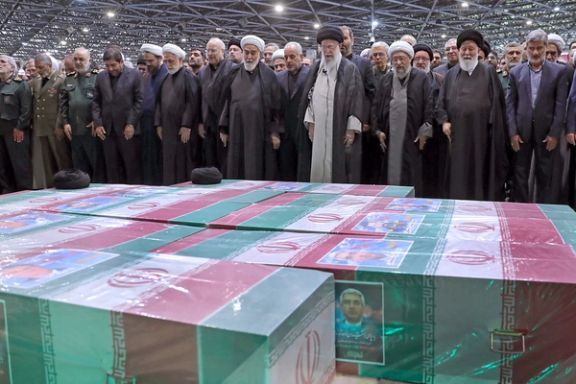
The United States will boycott a United Nations tribute on Thursday to Iranian President Ebrahim Raisi, who was killed earlier this month in a helicopter crash, a US official told Reuters.
The 193-member UN General Assembly traditionally meets to pay tribute to any world leader who was a sitting head of state at the time of their death. The tribute will feature speeches about Raisi.
"We won't attend this event in any capacity," a US official, speaking on condition of anonymity, told Reuters. The US boycott has not previously been reported.
Iran's mission to the United Nations in New York declined to comment to Reuters.
Raisi, a hardliner who had been seen as a potential successor to Supreme Leader Ayatollah Ali Khamenei, was killed when his helicopter came down in mountains near the Azerbaijan border on May 19.
"The United Nations should be standing with the people of Iran, not memorializing their decades-long oppressor," said the US official in a sharp reversal of earlier policy. "Raisi was involved in numerous, horrific human rights abuses, including the extrajudicial killings of thousands of political prisoners in 1988."
"Some of the worst human rights abuses on record, especially against the women and girls of Iran, took place during his tenure," the official said.
The UN Security Council stood at the beginning of an unrelated meeting for a moment of silence on May 20 to remember the victims of the helicopter crash. Deputy US Ambassador to the UN Robert Wood reluctantly stood with his 14 counterparts.
This led to sharp criticism of the Biden administration by several Republican lawmakers and many Iranian-Americans, who argued that Raisi was deeply involved in killings and repression of opponents throughout his career as a regime official. In 1988 alone, Raisi was part of a “Death Committee” that ordered the summary executions of 3000-5000 political prisoners serving their jail terms. Families of some of these victims and other government atrocities with Raisi’s involvement are US citizens.
The United States expressed its "official condolences" for Raisi's death, the State Department said on May 20. White House national security spokesperson John Kirby also said that day: "No question this was a man who had a lot of blood on his hands."
Raisi, 63, was elected president in 2021 and in office ordered a tightening of morality laws, oversaw a bloody crackdown on anti-government protests and pushed hard in nuclear talks with world powers.